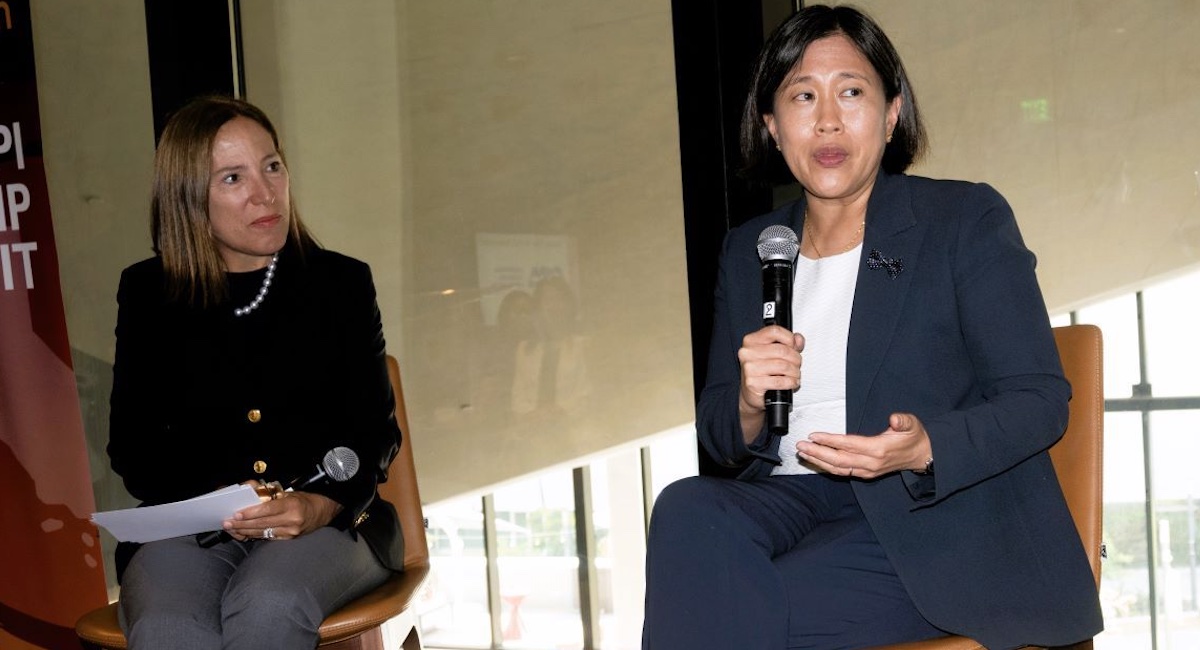SACRAMENTO, Ca. — Uncertainty looms large as to whether China’s President Xi Jinping will attend the Asia Pacific Economic Cooperation Summit — APEC — this November, said US Trade Representative Ambassador Katherine Tai.
Speaking Sept. 8 at the AAPI Leadership Summit here, Tai — in a conversation moderated by California Lt. Governor Eleni Kounalakis — expressed her doubts that Xi would attend the APEC summit, scheduled to be held Nov. 17-19 in San Francisco.
Tai noted that Xi skipped the G20 summit held Sept. 9-10 in New Delhi, India, sending his second-in-command, Li Qiang in his place. India and China are engaged in a longstanding border dispute, making it unclear as to whether Xi’s snub was intended for Indian Prime Minister Narendra Modi or for President Joe Biden, who delivered remarks Sept. 9 at the G20 summit before leaving for Vietnam.
“President Biden and Xi met last year in Bali, and there was very clear communication from both sides that we should engage,” said Tai.
“The US-China trade relationship is one of profound importance, not just for the US and China, but for the rest of the world. The future of our relationships have consequences for the trade aspirations of the rest of the world,” she said.
Word From China
Earlier that week, China’s top security agency hinted that Xi would not attend APEC. “To truly realize ‘from Bali to San Francisco’, the United States needs to show enough sincerity,” the Ministry of State Security said in a Sept. 5 post on WeChat. The Biden administration had adopted a dual-natured strategy towards China, inviting competition with China but also wanting to control the competition, claimed the Ministry, as reported by Reuters.
“There is a lot of excitement. Our partner countries know California,” said Tai, adding that the November meet will be the largest diplomatic gathering in San Francisco since 1945. The City that year hosted delegates from 50 nations for the United Nations Conference on International Organization.
Drivers of Economic Growth
Kounalakis noted that — post the Covid-19 pandemic — several indicators suggest that the state of California is the fourth largest economy in the world, with a $3.3 trillion economy. The lieutenant governor noted that 40% of all shipping in the US comes through California, the majority at the ports in Long Beach.
The three-day APEC summit will bring together leaders from 21 countries, who represent 60% of the world’s economy, and 50% of global trade.
APEC will focus on three drivers of economic growth: trade and investment; innovation and digitalization; and strong, balanced, secure, sustainable, and inclusive growth.
“Through APEC, the United States seeks to advance a free, fair, and open economic policy agenda that benefits U.S. workers, businesses, and families,” said the State Department, which is organizing this year’s summit, in a press statement.
“The joint vision of APEC and its 21 Member Economies is to realize an open, resilient, dynamic, and peaceful Asia-Pacific community by 2040 for the prosperity of all our people and future generations.”
India is not an APEC country, but Biden has invited Prime Minister Narendra Modi to attend the summit. As of press time Sept. 12, New Delhi had not stated whether Modi has accepted Biden’s invitation.
In an interview on the sidelines of the Leadership Summit, Ethnic Media Services asked Tai if the Biden Administration was attempting to shore up its relationship with India to mitigate its reliance on China in the Asia-Pacific region. Earlier this year, Biden hosted a State Dinner for Modi at the White House, and met with him again at the G20.
“The US-India relationship is entirely valuable in itself,” said Tai, briefly emphasizing the importance of trade between the two countries.
In earlier interviews, Tai said the US is not trying to “decouple” the American economy from China’s economy.




